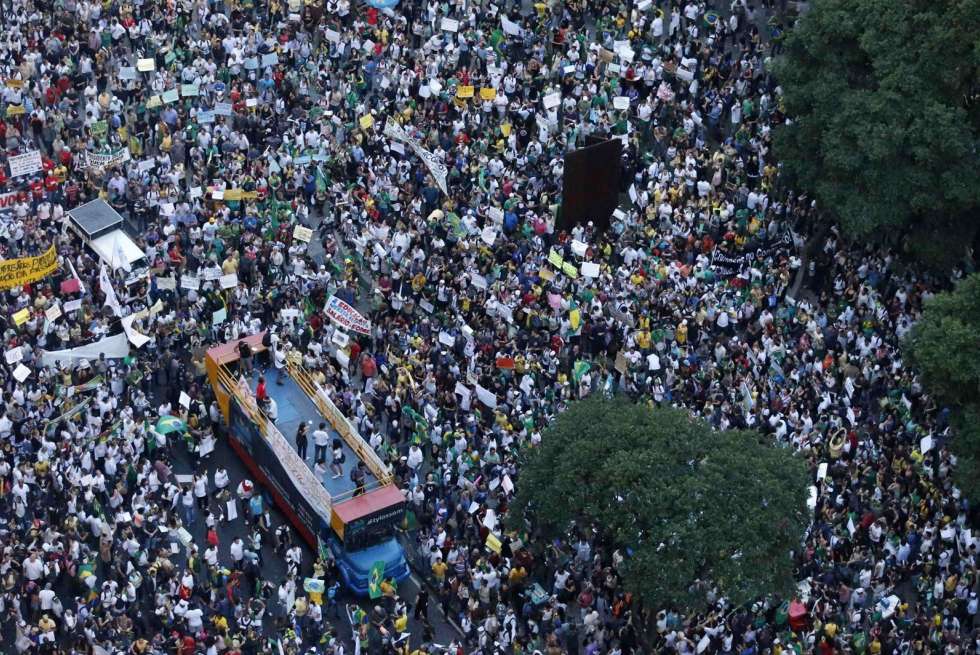Long Live the Free Pass Movement
From the Series: Protesting Democracy in Brazil
From the Series: Protesting Democracy in Brazil

(This was originally published in the Mexican newspaper La Jornada. Translated by Paul M. Ross.)
There has been no lack of persons who have received the social movement that is now camped out in Brazil with the joy that is reserved for the misfortune of others, what the Germans call Schadenfreude. After all, wasn’t everything going so well in Brazil? (A rhetorical question, which usually gives way to a diatribe about how that country’s economic model ran out of steam, how Brazilian accomplishments were exaggerated, etc.)
But independently of the very real problems faced by Brazil, the Movimento Passe Livre marks the appearance of a new political horizon, based, fundamentally, on the demand for a basic and common threshold of citizen well-being, a well-being that is based on the sole fact of being a citizen.
Moreover—and this is a notable matter—the movement is also a rebellion against the bread and circuses that have characterized the public policy of governments practically the world over. Brazil’s people have had the creativity and courage to rise up against the apotheosis of a sport that they, perhaps more than anyone in the world, have helped to create. But regardless of the soccer fanaticism of the Brazilian nation, their disgust is understandable.
According to the financial press, Brazil will spend around 35 billion dollars between the World Cup of soccer and the Olympic Games. There was once a time when soccer players wore jerseys with the insignia of their teams, and that was all. Today, the players are a veritable kaleidoscope of advertisements. A chilena (back-flip and kick) shown in slow motion is like a salad of brands spinning in a blender.
A star player like Neymar earned 22.5 million euros last year, of which almost 70 percent came from endorsements and advertisements. Some players, such as Messi, are under investigation for tax evasion in the millions. Others, like Cristiano Ronaldo, endorse companies such as Herbalife, which is at present being investigated in the United States as a possible pyramid scheme. The truth is that players have no real way of knowing whether the products they advertise are good or bad, and it hardly matters (there are so many!). What matters is that the companies pay them sums in the millions. In exchange for which, a player appears eating yogurt, drinking potions, wearing athletic shoes, or carrying credit cards. Always smiling, of course.
The investment of millions in pharaonic works like the World Cup or the Olympics is always sold to the public as an investment that will be paid back by an article of faith similar to the economic doctrine of Ronald Reagan—the famous “trickle-down economics” which supposes that offering fiscal incentives or public investment to big capital will end up benefiting everyone. In other words, a policy favorable to big corporations will “bespatter” its benefits upon all. However, just like the Reagan doctrine, investments in Olympic Games and World Cups carry with them enormous inequalities: the citizenry of Brazil must pay 35 billion dollars so that Neymar can keep collecting his 22 million euros per year, so the corporations can get their publicity, and so the inhabitants of Rio can keep living the way they live.
The demands of the Movimento Passe Livre possess a kinship with the so-called “pirate” parties of northern Europe, in the sense that they seek to create or fortify public spaces for the common good, open to the population as a whole: public transportation should be free and of high quality, the Internet and access to communication should be free, schooling should be free and of high quality . . .

There are those who say that in both cases we are faced with populist demands, which would ruin any State. Maybe so. But the numbers should be crunched, and the public discussion opened. Because up until now, subsidies disproportionately favor certain minority sectors, and no one ever questions whether those expenses are “populist,” sustainable, or otherwise. (Does Brazil even have 35 billion dollars to spend?)
For example, there are 5 million cars that circulate every day in the city of Sao Paulo. The streets are clogged, and the whole population spends hours every day getting from one place to another. But only 20 percent of the population has a car. How much public money is being spent for all of those cars? How many unproductive hours? We don’t know. But we do know that no one says that funding a city built for 20 percent of the population is a “populist” or “unaffordable” measure. The demand for free transportation would need to be discussed with the bills for car transportation in hand, and the government subsidy would have to be for the majority—the users of public transportation—owing to the simple fact that they are the majority.
In this, the Movimento Passe Livre has an enormous lead in terms of economic imagination compared with the traditional line of the ruling Workers Party (PT, from its Portuguese initials). It has to be remembered that Lula was a worker in the automotive industry, and the proletarian romance with the automobile was at the very root of the idea of progress supported by the PT. The Movimento Passe Livre is demanding something different, and is demanding it right away: enough already with monumental investments made with faith that in the long run, everything will get better. It is necessary to invert state priorities: first guarantee a basic threshold of general well-being, and fortify free, publicly used spaces for sociability—streets, parks, the Internet. That would generate a “trickle-down effect” in the economy as a whole, but founded on a system of irrigation that would be less radically unequal.